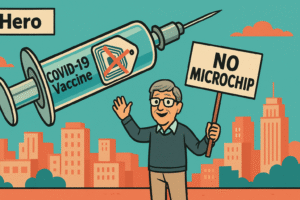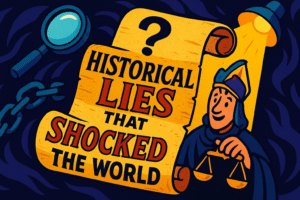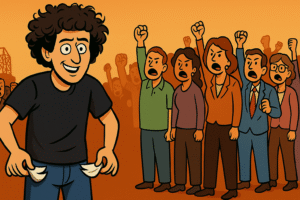Top 5 Celebrity Scandals of the 2000s
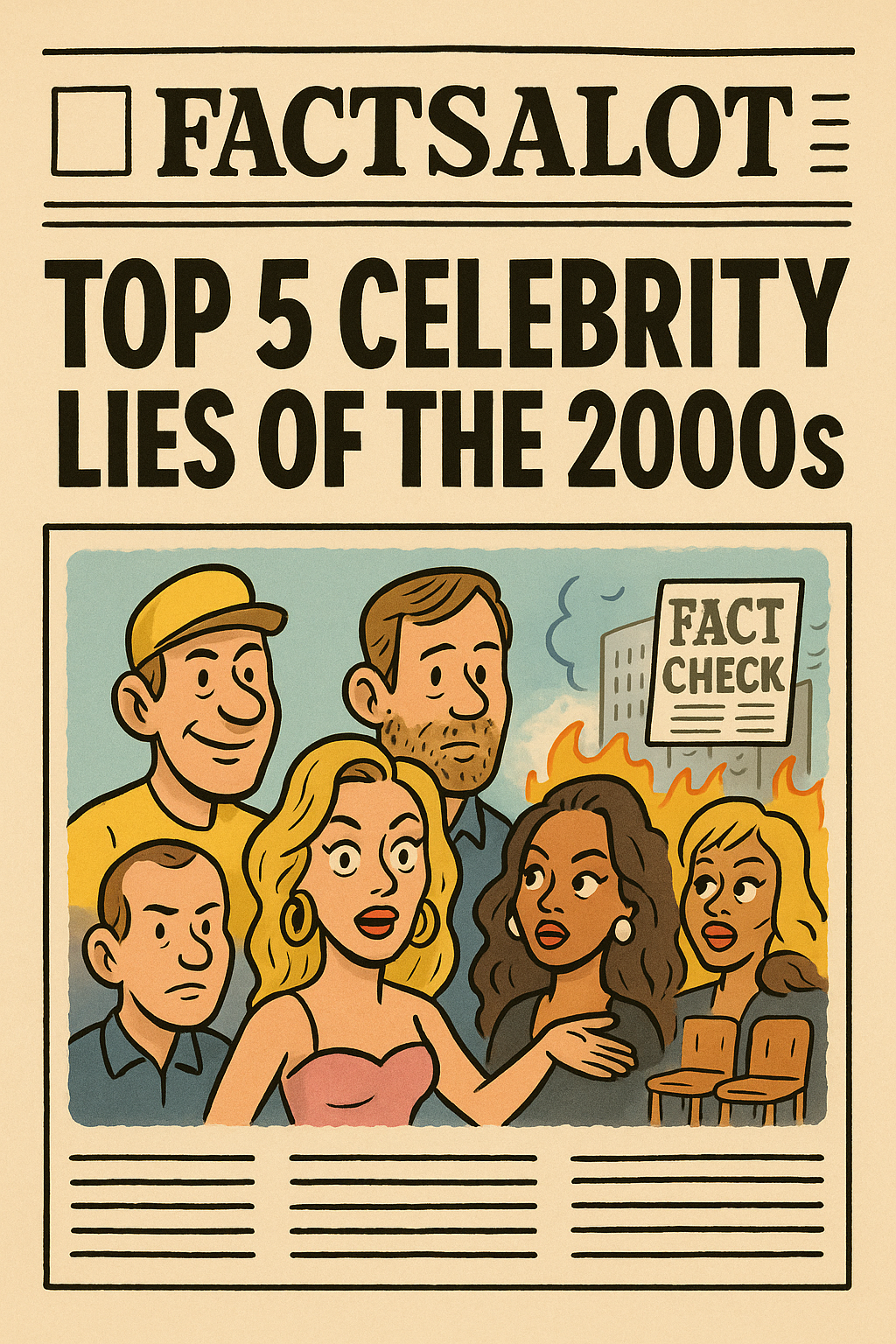
The 2000s marked an era when celebrity culture didn’t just blossom—it detonated under the glare of global media, and with it came an unprecedented level of scrutiny. In each of the high-profile scandals above, fame granted a megaphone—but it also amplified the fallout when “celebrity scandals” were exposed. Whether the deception was driven by self-preservation, boundless ambition, or the urge to perpetuate a myth, these fabrications remind us how swiftly even the most meticulously crafted narratives can implode.
Some reckon the damage was beyond repair—Lance Armstrong’s fall, for instance, became a cautionary tale of how one man’s quest for glory can shatter under relentless investigation. Others found a more forgiving path: when Kate Winslet chose honesty over obfuscation, her candid admission softened the blow and even restored a measure of public goodwill. Yet in every case, the truth was inexorable—and the world, equipped with instant news feeds and social media, watched every twist as it unfolded.
Table of Contents
1. Lance Armstrong – “One Big Lie” About Doping
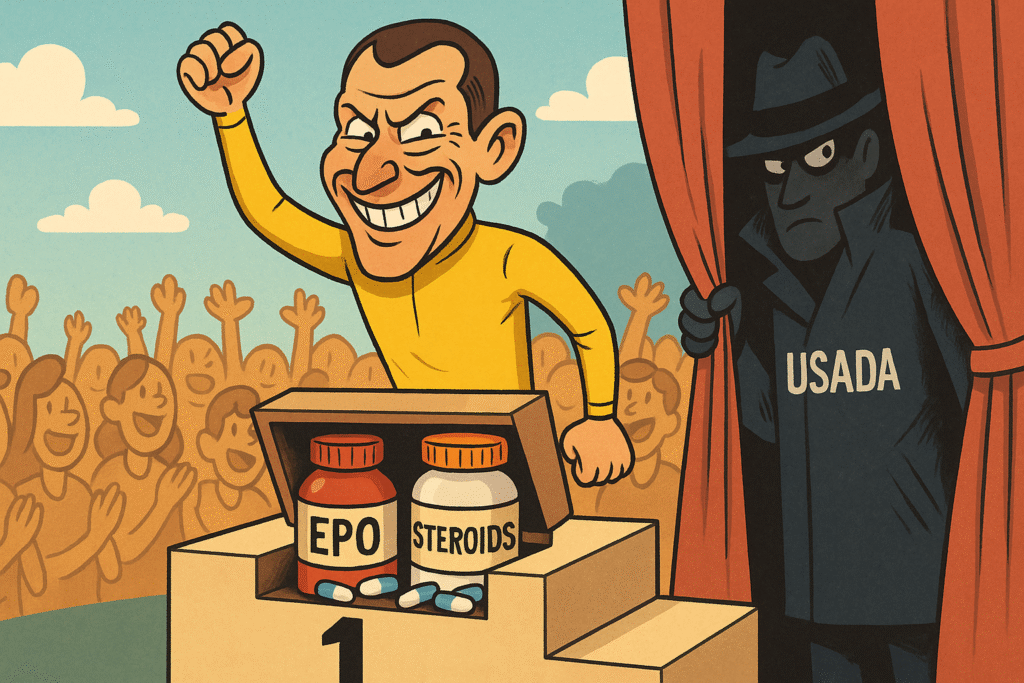
Lie:
For years, Olympic cyclist Lance Armstrong denied ever using performance-enhancing drugs, repeatedly calling the accusations “ludicrous.” In press conferences and even before Congress, he maintained a spotless public image and insisted he was clean.
Exposure:
In late 2012, a U.S. Anti-Doping Agency (USADA) investigation concluded that Armstrong had led “the most sophisticated, professionalized and successful doping program that sport has ever seen.”
Just a few months later, in January 2013, Armstrong sat down with Oprah Winfrey for a tell-all interview. There, he finally admitted to using “steroids, EPO, and PEDs” throughout his cycling career.
“Winning the Tour de France was one big lie that I repeated a lot of times.”
— Lance Armstrong, Oprah Winfrey Interview, January 2013
Source: The Guardian
Impact:
The confession shattered Armstrong’s legacy. He was stripped of all seven Tour de France titles, resigned from his cancer charity Livestrong, and lost lucrative endorsement deals with Nike, Anheuser-Busch, and others.
“The culture of doping in cycling… I’m now paying the price for that.”
— Lance Armstrong
Source: The Guardian
Armstrong went from being a symbol of perseverance and survival to one of the most infamous frauds in sports history.
2. James Frey – Fabricated Memoir A Million Little Pieces
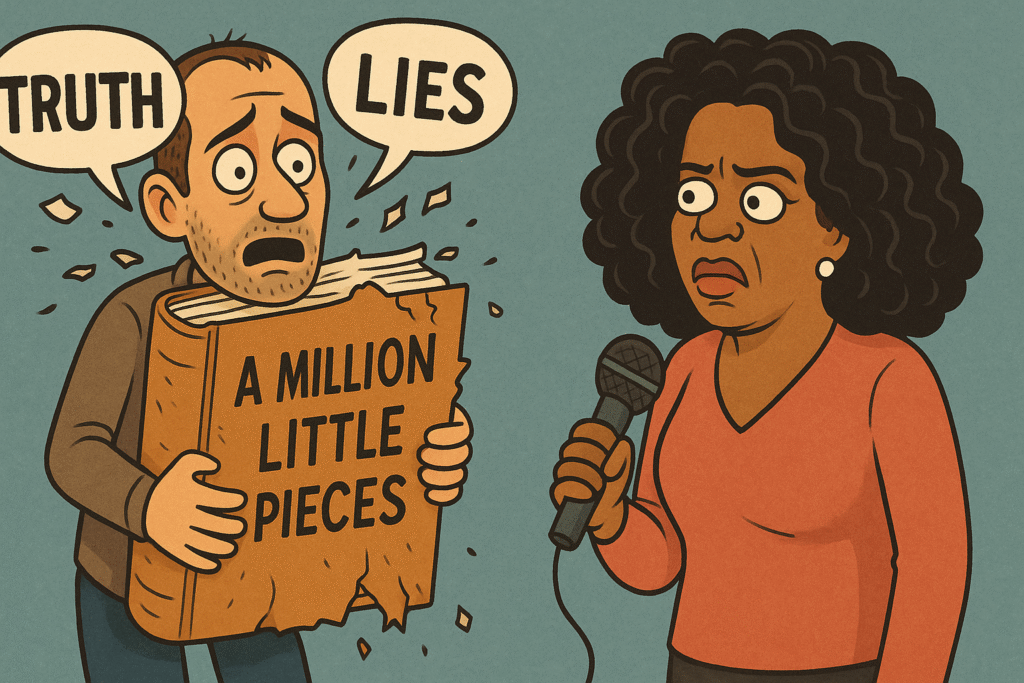
Lie:
James Frey’s 2003 memoir, A Million Little Pieces, was marketed as a raw and truthful account of his struggles with drug addiction, crime, and recovery. Frey claimed he had spent 87 days in jail, undergone grueling medical procedures like root canals without anesthesia, and survived a chaotic descent into substance abuse.
When Oprah Winfrey selected the book for her Book Club in 2005, it became a bestseller and earned Frey mainstream credibility.
Exposure:
In January 2006, The Smoking Gun published a detailed exposé titled “A Million Little Lies”, revealing that Frey had grossly exaggerated or fabricated large portions of the memoir. Court records showed that his jail time lasted only a few hours, not 87 days.
Soon after, Frey was brought back onto The Oprah Winfrey Show, where Oprah—who had originally praised the book—publicly confronted him.
“I asked you specifically, ‘Did you really spend 87 days in jail?’ and you said yes. The truth is, you had spent a few hours.”
— Oprah Winfrey
Source: History.com
Frey admitted that he had “altered and embellished” parts of his story, and even stated he couldn’t confirm if the notorious dental procedure without Novocain had actually happened.
Impact:
The fallout was swift. Frey’s publisher, Random House, added disclaimers to future editions of the book. His literary agent dropped him, and a class-action lawsuit was filed by readers who felt deceived.
“I feel duped. But more importantly, I feel that you betrayed millions of readers.”
— Oprah Winfrey
Source: History.com
Frey’s reputation took a serious hit. Although he continued to write and publish, he remains a cautionary tale about the blurry line between memoir and fiction—and the cost of crossing it.
3. Lil’ Kim – Perjury in Shooting Investigation
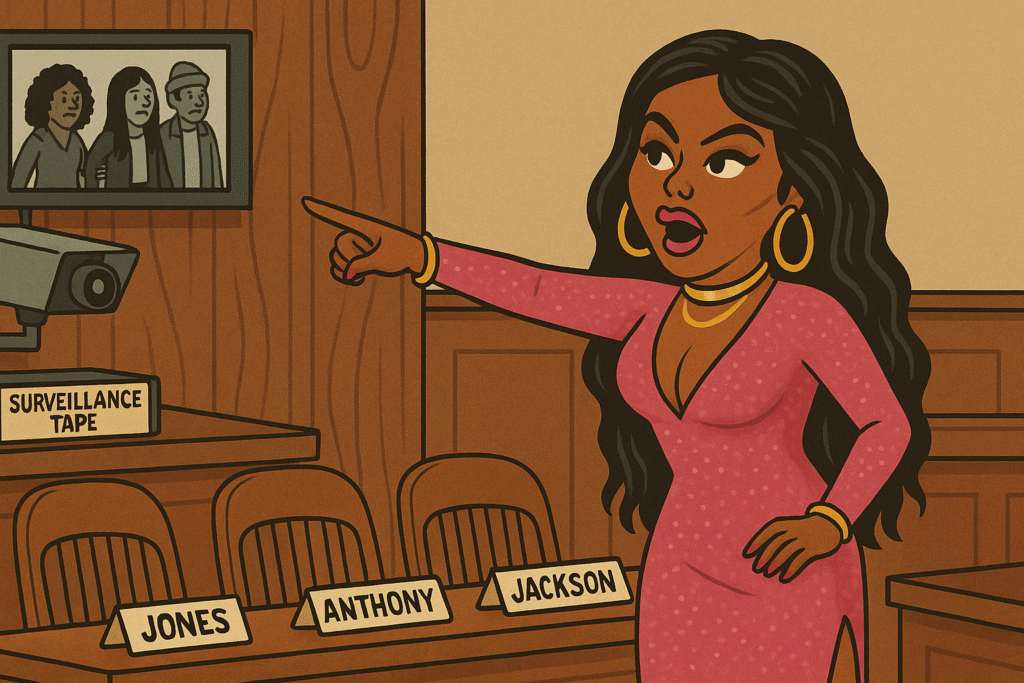
Lie:
In 2001, a shootout erupted outside the Hot 97 radio station in New York City, involving members of rival rap crews. Rapper Lil’ Kim (real name: Kimberly Jones) later told a federal grand jury that two of her close associates were not present during the incident—despite knowing they were.
Her false testimony was an apparent attempt to protect her entourage and maintain her public image.
Exposure:
Lil’ Kim’s story unraveled when surveillance footage and witness testimony placed the two men she denied knowing at the scene.
In July 2005, she was convicted of perjury and conspiracy for lying to a federal grand jury.
“At the time I thought it was the right thing to do, but I now know it was wrong.”
— Lil’ Kim, at her sentencing
Source: The Guardian
Impact:
Lil’ Kim was sentenced to one year and one day in federal prison (serving 10 months) and ordered to pay a $50,000 fine.
“Jones was convicted of three counts of perjury and one of conspiracy for lying to a federal grand jury investigating the shootout.”
Source: The Guardian
The case received intense media attention, turning Lil’ Kim into a symbol of how celebrity loyalty and legal risks can collide. Her prison sentence damaged her public image, shifting her persona from glamorous rap icon to convicted felon—at least temporarily.
4. Steve Rannazzisi – False 9/11 Survival Story
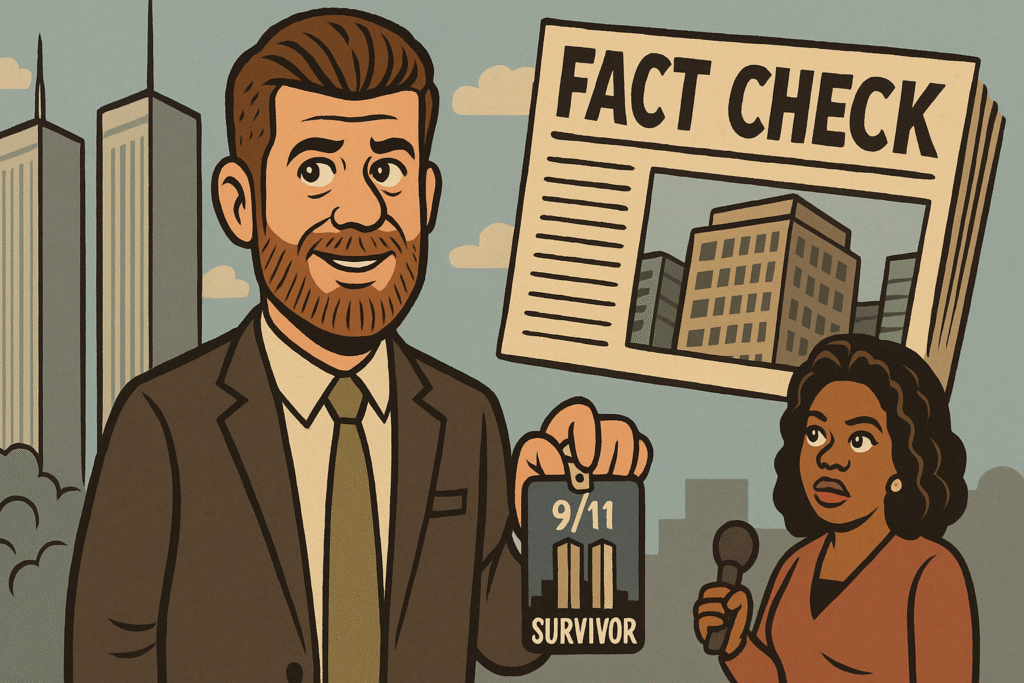
Lie:
For years, comedian and actor Steve Rannazzisi—best known for starring in The League—told a gripping story: that he narrowly escaped the South Tower of the World Trade Center during the September 11 attacks.
He claimed he was working for Merrill Lynch on the 54th floor, fled just before the building collapsed, and that the traumatic experience inspired his decision to pursue comedy in Los Angeles.
Exposure:
In September 2015, The New York Times and other outlets published findings that directly contradicted his account.
Rannazzisi had in fact been working at an office in Midtown Manhattan, not the Twin Towers. Merrill Lynch had no record of employing him, nor did it have offices in the South Tower.
Confronted with this evidence, Rannazzisi admitted publicly that his story was entirely fabricated.
“I don’t know why I said this. This was inexcusable. I am truly, truly sorry.”
— Steve Rannazzisi, Twitter apology
Source: E! Online
He later elaborated in interviews that it was a lie he told early in his career, which “became too late to undo.”
Impact:
The fallout was immediate. Rannazzisi lost endorsement deals, including a Buffalo Wild Wings campaign, and faced widespread criticism and ridicule—especially for invoking a national tragedy.
“It was profoundly disrespectful to those who perished and those who lost loved ones.”
— Steve Rannazzisi
Source: E! Online
Though he continued to work in entertainment, the scandal permanently altered his public image. His case remains one of the most egregious examples of celebrity self-mythologizing gone wrong.
5. Kate Winslet – Falsified Near-Death Story on The Graham Norton Show
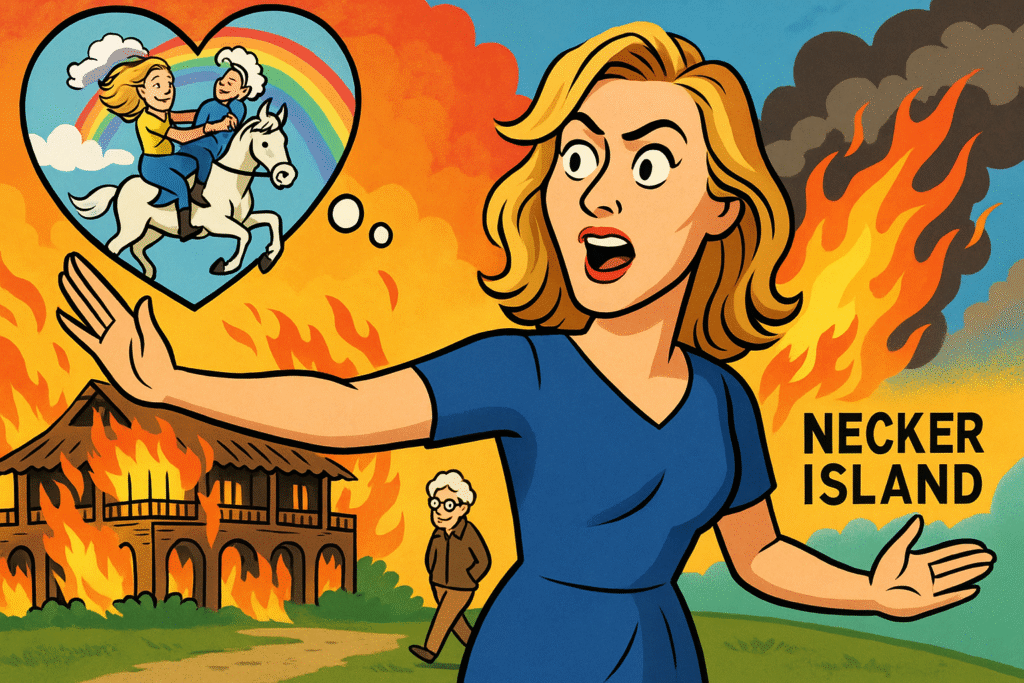
Lie:
In 2013, Oscar-winning actress Kate Winslet appeared on The Graham Norton Show and recounted a thrilling tale: while vacationing on Richard Branson’s private Necker Island in 2011, she claimed to have carried Branson’s 90-year-old mother out of a burning building during a dramatic fire. The story captivated viewers and was widely repeated in media outlets.
Exposure:
Over time, Branson’s mother, Eve Branson, and other sources offered different versions of the event. Eve herself later clarified that she had walked out of the building unaided, and Winslet’s story—though partially rooted in real events—had been significantly embellished.
Winslet eventually admitted in interviews that she had exaggerated aspects of the story.
“I did not rescue her. She walked out on her own. I just helped calm things down.”
— Kate Winslet
Source: The Independent
Impact:
Unlike other entries on this list, Winslet’s fib did minimal long-term damage to her reputation. While some media outlets criticized her for self-aggrandizement, many fans viewed the lie as relatively harmless, especially after her clarification.
“I was just trying to describe how scary it all was, but yes—I did overstate things.”
— Kate Winslet
Source: The Independent
Still, the incident stands as a reminder that even subtle celebrity exaggerations—especially those involving real-life trauma—can spark headlines when the facts don’t align.
Conclusion: The Price of a Public Lie
The 2000s were a decade when celebrity culture exploded—and so did the scrutiny. In each of the cases above, fame provided a platform, but it also magnified the fallout when the truth came out. Whether the motive was self-protection, ambition, or myth-making, these celebrity scandals remind us how quickly carefully crafted narratives can collapse. For some, like Lance Armstrong, the damage was irreparable. For others, like Kate Winslet, a candid admission softened the blow. In all cases, the truth eventually caught up—and the world was watching.
Frequently Asked Questions (FAQs)
Why do celebrities lie about their pasts or experiences?
Celebrities often craft personal narratives to inspire, protect their image, or enhance marketability. In a competitive industry, dramatic backstories or heroic experiences can attract attention, sympathy, and career opportunities. However, once those stories are debunked, the consequences can be severe.
Were there any legal consequences for these lies?
Yes, in some cases. Lil’ Kim was convicted of perjury and sentenced to prison. Lance Armstrong faced lawsuits, lost sponsorships, and was stripped of his titles. James Frey faced a class-action lawsuit from readers, though he wasn’t criminally charged. Others, like Kate Winslet and Steve Rannazzisi, suffered more from public backlash than legal consequences.
Did any of these celebrities recover their reputations?
Some did, at least partially. Kate Winslet’s transparency helped her maintain credibility. James Frey eventually returned as a fiction writer. Lance Armstrong remains controversial but has been the subject of nuanced documentaries. Public forgiveness often depends on the nature of the lie and the sincerity of the apology.
What role did the media play in exposing these lies?
The media played a crucial role in investigating and exposing inconsistencies. Outlets like The Smoking Gun, The New York Times, and Oprah’s talk show were instrumental in uncovering or confronting falsehoods. Once exposed, these stories spread quickly through 24/7 news cycles and social media.
Are celebrity scandals more common today?
While celebrity scandals are not new, the rise of social media means that unverified personal stories spread faster and are more likely to be scrutinized. Today, digital footprints and fact-checking make it harder for public figures to maintain false narratives for long—though some still try.
What are the biggest celebrity scandals of the 2000s?
Some of the biggest include Lance Armstrong’s doping denial, James Frey’s fake memoir, and Steve Rannazzisi’s false 9/11 survival story.
Did Lance Armstrong admit to doping?
Yes. In 2013, Armstrong confessed to using performance-enhancing drugs throughout his cycling career during an interview with Oprah Winfrey.
Was James Frey’s A Million Little Pieces a true story?
No. Frey admitted in 2006 that key parts of the memoir were exaggerated or fabricated.
What did Lil’ Kim lie about?
Lil’ Kim was convicted of perjury for lying to a grand jury about her associates’ involvement in a 2001 shootout.
Did Kate Winslet really rescue someone from a fire?
No. Winslet later admitted she exaggerated her role in helping Richard Branson’s mother escape a house fire.
Sources – celebrity scandals
- The Guardian – “Lance Armstrong admits doping in Oprah interview”
https://www.theguardian.com/sport/2013/jan/18/lance-armstrong-doping-confession-oprah - USADA – Reasoned Decision on Lance Armstrong
https://d3epuodzu3wuis.cloudfront.net/ReasonedDecision.pdf - History.com – “Oprah confronts James Frey”
https://www.history.com/this-day-in-history/oprah-confronts-author-james-frey - The Smoking Gun – “A Million Little Lies”
https://www.thesmokinggun.com/documents/celebrity/million-little-lies - The Guardian – “Lil’ Kim sentenced to a year in prison for perjury”
https://www.theguardian.com/world/2005/jul/07/usa.musicnews - CNN – “Rapper Lil’ Kim guilty of perjury”
https://edition.cnn.com/2005/LAW/03/17/lilkim.trial/index.html - E! Online – “Steve Rannazzisi admits 9/11 survival story is false”
https://www.eonline.com/news/694693/steve-rannazzisi-says-his-9-11-story-isn-t-true-in-apology-it-was-inexcusable - The New York Times – “Steve Rannazzisi Admits Lie About 9/11”
https://www.nytimes.com/2015/09/17/arts/television/steve-rannazzisi-9-11.html - The Independent – “Kate Winslet admits she did not rescue Richard Branson’s mother”
https://www.independent.co.uk/news/people/kate-winslet-admits-she-did-not-rescue-richard-branson-s-mother-from-fire-8942186.html - BBC News – “Fire destroys Richard Branson’s luxury Caribbean home”
https://www.bbc.com/news/world-latin-america-14622023

